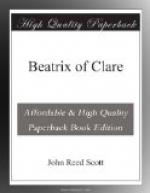The Bishop arose and spreading out the parchment began:
“I, Henry Stafford, Duke of Buckingham, being about to suffer on the block (which even now stands ready before my window) do hereby make, publish and declare this as and for my dying declaration; trusting that thereby I may be of service to one who, though my foe in war, has been my friend in peaceful days, and now, as well, when all others have forsaken and betrayed me—and may, at the same time, bring to justice a pair of caitiffs. By these presents, do I denounce and proclaim Henry, Lord Darby, and John Morton, ycleped Bishop of Ely, as perjured and forsworn traitors to Richard, King of England, as well as betrayers of their plighted faith to me. Further, do I hereby admonish Richard Plantagenet that this Darby (whom I have but this hour observed among his forces in this town) and the aforesaid priest, Morton, are the instigators of my rebellion; that these two aided me in all the scheming of the plot; that to Darby was assigned the proclaiming of Henry Tudor in Yorkshire and the North; and that, within one week of the day set for the rising, he was at Brecknock and completed the final details. That he was a double traitor I knew not until I saw him here in the courtyard this day. Also, I denounce——”
“Stay, my Lord Bishop!” the King interjected. “Read no further for the present.”
“Since when, I pray, Sire, has it become the law of England to admit only such part of a paper as may suit the prosecution’s plan?” Darby cried.
“You wish it read entire?” Richard asked.
“Marry, that I do. Since I am already judged, it can work me no hurt.”
Richard looked at him fixedly. “You are overbold, sirrah!”
“Those who speak truth to a King must needs be so,” was the curt rejoinder.
“Steady your tongue, Lord Darby,” said Richard sternly, “else may the Tower teach you respect for England’s King.”
“Think you, then, I should find the young Fifth Edward there------alive?” sneered Darby.
For a moment, Richard’s eyes flashed like sparks springing from the clashing of two angry swords. Then he smiled; and the smile was more ominous than the sparks.
“Be easy, sir; the remainder of the declaration shall be read in season,” he said very quietly. “But first, will you reply now to Stafford’s allegation, or shall we proceed with Sir John de Bury’s charge?”
If this were all the evidence of treason Darby was in small danger and it behooved him to change his bearing.
“I did Your Majesty grave wrong in presuming you had prejudged me,” he said with a frank smile, “for well I know that on such shallow falsehoods no man could ever be condemned. And here do I place my own knightly word against the traitor Buckingham’s; and do specifically deny all that has been read by the Lord Chancellor. And further, do I solemnly affirm that neither by voice nor deed have I been recreant to my oath of allegiance, nor false to you. Moreover, Sire, my very action in the rebellion attests my truth: Did I not hasten to join your army with all the force at my disposal? Have I not been ever honest and faithful?”




